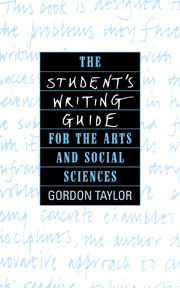Summary
A speech has two parts. You must state your case and you must prove it. You cannot either state your case and omit to prove it, or prove it without first having stated it; since any proof must be a proof of something and the only use of a preliminary statement is the proof that follows it.
aristotleThe constituents of an essay
What Aristotle has to say about a speech applies equally to a modern academic essay: the opening states your proposition or answer, and the body of the essay justifies that answer. Our study in chapter 2 of the ways in which you can reflect on your essay topic has already prepared you for the writing of your opening. In this chapter we shall say more about how you can establish your case. Chapter 5 will take up the problems of justifying or demonstrating that case. In chapter 6 we learn how to write that part of an essay which Aristotle thought only an optional element, the conclusion or end.
We shall think of an essay, therefore, as a structure with an opening, a middle and an end. The opening states your case, the middle justifies it and the end reflects on the beginning and the middle.
- Type
- Chapter
- Information
- The Student's Writing Guide for the Arts and Social Sciences , pp. 89 - 105Publisher: Cambridge University PressPrint publication year: 1989



